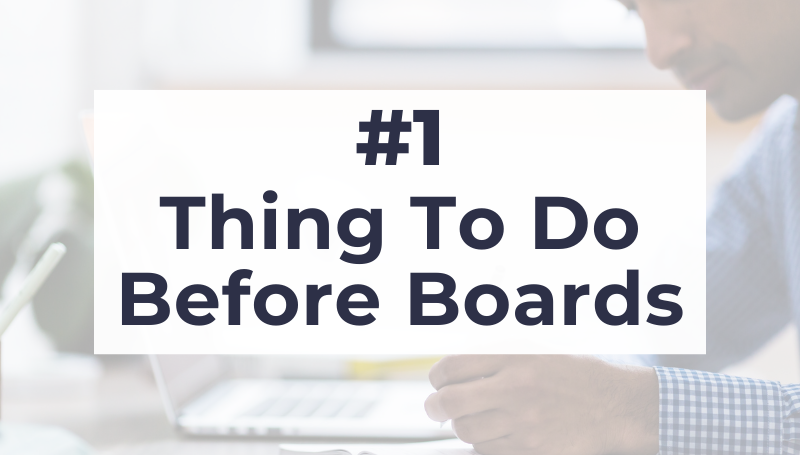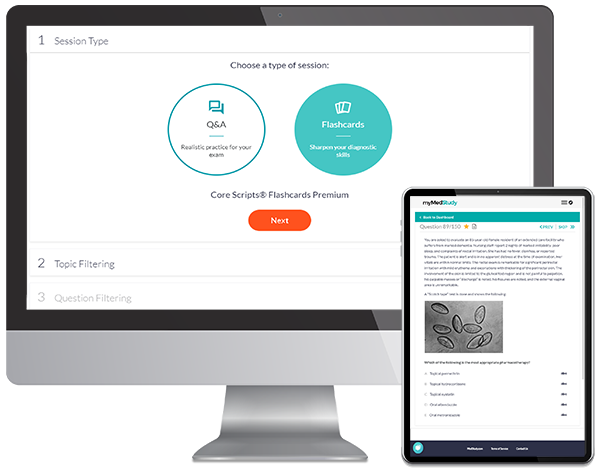
Initial certification exams are right around the corner. Are you knee-deep in work as well as study materials? We thought so.
Are you also wondering if you're studying in the most effective way? You're not alone!
So since it's especially hard to carve out dedicated study time right now, and you really need to make the most of each minute, we're here to tell you: Self-testing is the most essential and effective way to study right before your next exam.
Self-testing helps you make new information easily retrievable over the long term. In the months leading up to your next exam, shift to regular use of a Q&A bank. To self-test correctly, you should focus on understanding not only why a correct answer is right, but also why an incorrect one is wrong.
Make sure you're self-testing correctly
Pro Tip: You shouldn't be reading through materials or textbooks anymore—instead, try to use questions as a prompt to recall as much information as you can before you look up the answer. Here are a few ways to make sure you're getting the most out of self-testing.
- Have all the right tools. Use Q&As or Flashcards—but, especially the Q&As! This close to your exam, Q&As are a great study tool because they’re in the same style that the board questions will be. Not only are they like the questions on the exam, but the must-know topics are all there.
- Start to identify key concepts. As you go through the qbank, think about how a question writer creates the exam questions. They think about which concepts physicians must know and then write their questions based on those concepts. As you go through more and more questions, you'll get better at identifying the most important point or issue—making the correct answer more obvious.
- Fine-tune your learning. Have you ever looked at a Q&A, narrowed it down to two answers, but can’t decide which one it is? Use your comparing and contrasting skills to weed out the distractors and choose the correct answer. Every Q&A includes answer choices that are distractors that seem reasonable if you don’t know the topic well enough. Q&As help you to practice recognizing these errors.
"Most useful preparation for the exam. Really helped me become up to date with my knowledge." —Surendra Khera, MD
3 Must-know tips for studying with Q&A banks
- Don’t immediately jump to the answer. Before you look at the answers on the Q&A or flip over your Flashcards, dig up everything you possibly can about the topic in your head.
- Understand why the correct answer is correct and why the incorrect answer is incorrect. This will really help lock the information into your long-term memory.
- See a question that you don’t know? The Q&A helps you to identify knowledge gaps by allowing you to easily revisit a question that you previously answered incorrectly. You can also bookmark questions that you know you want to go back to later.
"Great questions, relevant to the boards questions and a very efficient way to review the material." — Carmen Bogdan, MD
If you’ve already gone through your Q&A bank...
Look at you, overachiever! So, what now?
Well… Do them again. Every time you go back through it, you deepen your learning and strengthen your recall. When you re-encode and re-consolidate new information by going over the Q&As multiple times, the memory traces you are making on those concepts become stronger and more durable.
"It helped me to consolidate and simplify the information in my trouble subjects." —Timothy Kuchera, MD
If you don’t have Q&As...
Start your free trial! Or you can:
- Create self-generated questions
- Study Preview | Review Questions in the Core
- Use flashcards
- Make a concept map
Remember, each time you self-test, the stronger your memories become. And if you take care of yourself, your memories will be easily accessible. Here's a little advice about both:
You got this!



